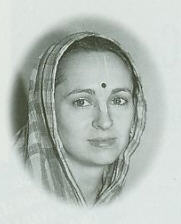
Urmila Devi Dasi
FOR MILLENNIA, parents sending their sons to school were also turning them over to a guru, not just to be a student but to be a disciple. The boy was expected not only to complete academic assignments but to serve the guru and live as he ordered for spiritual realization. In the last few hundred years, a boy has often continued to live with his parents after becoming a disciple, but in the ancient tradition the student lived with his teacher, often not seeing his family for months or even years.
When a child's teacher is a bona fide guru, the parents have full and firm faith that their child is properly cared for in all respects. The guru, in turn, teaches the student to obey and highly respect the parents. Lord Krsna says in the Bhagavad-gita that respecting one's parents is an austerity favorable to spiritual advancement. When initiating one of his first disciples, Srila Prabhupada told him to offer obeisances to his mother, who was attending the ceremony.
A bona fide guru teaches detachment from material family affection, but not abandonment of Vedic etiquette that aids spiritual life. So a great bond of love and faith forms between a child's parents and teacher. The child is surrounded with an identical spiritual focus from home and school.
Few of the elements of Vedic education are present in modern education. For example, in secular schools at least, school lessons come not from scripture but from the imperfect and changing conclusions of ordinary people; most modern teachers don't consider that students need to develop spiritually to understand and apply what's learned in school. Views held at home and those taught at "philosophically neutral" government schools often clash, putting parents at odds with teachers, with the students in between.
Look for the Views
Though a school might appear neutral, it inevitably has a philosophy about the ultimate purpose of learning and of life. So parents must always carefully monitor what points of view their children are learning from the textbooks, teachers, and other students.
Teachers and parents today are often wary of one another, and in some cases even antagonistic. Teachers assume that many parents will contradict their instruction. If a religious family sends their child to a secular school, the conflict can become intense, as the basic world views are so different. Indeed, devotees of Krsna who send their children to an ordinary school must frequently remind their children to filter the words and actions of the teacher, in effect begging their children to reject their teachers as gurus.
An Ideal Relationship for Today
In the Hare Krsna movement today, few children become the literal disciples of their teachers. Our teachers, therefore, cannot claim the ideal guru-student relationship with the children they teach. Nor can they expect the same trust a guru would receive from the students' parents.
Yet we can call our ISKCON schools gurukula "the place of the guru" because all the teachers are supposed to represent a bona fide guru, both in their instructions and in their lives. These teachers put great effort into bringing a Krsna conscious perspective to all subjects.
Because our students haven't dedicated body, mind, and words to their teachers, the teachers understand that the children's parents stay the primary authority. Teachers see themselves as servants of the parents and of their own guru. And parents see the teachers as godbrothers and godsisters who work with them to guide the children.
Neither teacher nor parent expects absolute trust, but both work toward a harmony of philosophy and goals. Each gives the other the benefit of the doubt and encourages the children to respect both.
A close bond then forms between child, home, and school that extends far beyond the school hours and graduation date. When the child matures and accepts a guru, parents and teachers will have worked to form the foundation for that all-important decision.
Urmila Devi Dasi and her family run a school for boys and girls in North Carolina. She is the major author and compiler of Vaikuntha Children, a guide to Krsna conscious education for children.
